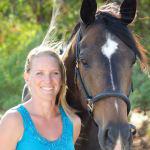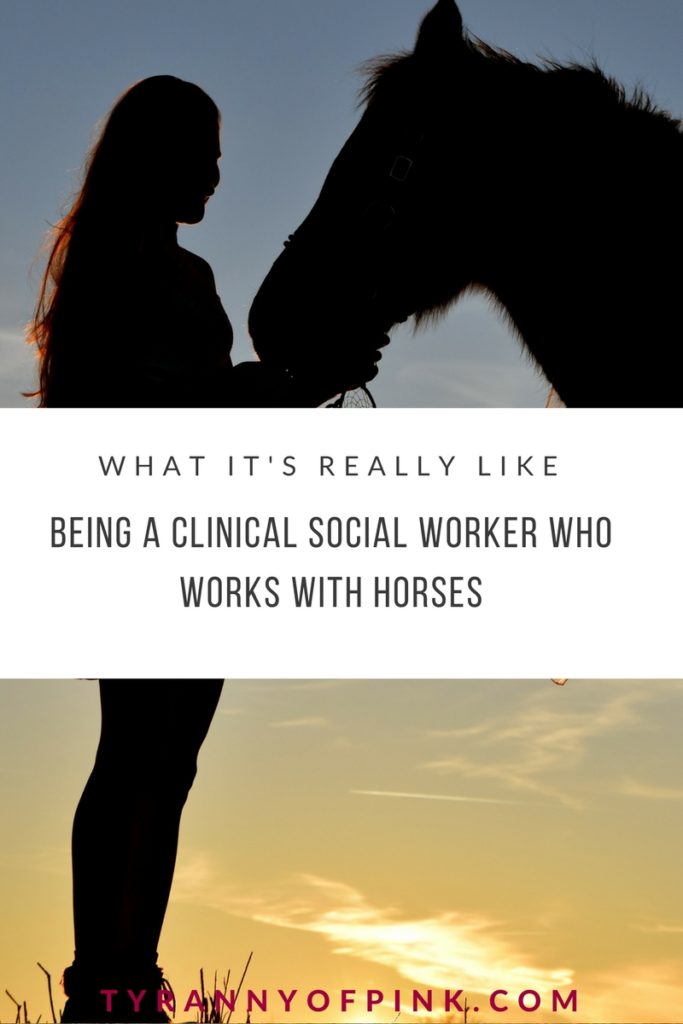What is your job / what field are you in?
I am in the mental health and wellness field and am a qualified Clinical Social Worker working in both private practice and a Non-Governmental Organisation. I use Equine Assisted Therapy and Learning as my modality which is a facilitated process between a horse/s, a mental health and equine (horse) specialist and a client/clients who are seeking therapy/skills development.
[bctt tweet=”Want to work with horses? Sarah is a Clinical Social Worker who works with horses to help clients! ” username=”tyrannyofpink”]
Do you need a qualification for it? If yes, what and how long does it take?
Qualifications vary depending on how you want to be involved.
A horse specialist requires certain qualifications in horse behaviour and management and a number of hours to qualify for the certification process of becoming an Equine Assisted Therapy and Learning facilitator. The length of this depends on each person and how they are able to achieve the requirements.
A mental health specialist is required to have a qualification that allows them to practice within their chosen scope of practice (counsellor, clinical social worker, psychologist, psychiatrist, etc) and to complete the certification process of becoming an Equine Assisted Therapist/Learning facilitator. The length of this depends on the qualification chosen, whether one has the qualification or is starting from scratch and what type of qualification that is chosen.
Both options require qualification and certification in the Equine Assisted Therapy model (there are several bodies available to certify with, I use e.a.g.a.l.a. http://www.eagala.org/ which is internationally recognized) which is a minimum of 3 to 5 day workshops and educational hours along with other requirements before one is allowed to practice.
Both options require continued education above and beyond their requirements for their initial qualification (i.e. social workers need to attain 20 CPD points per year for their professional board and require 20 continuing education points over two years for the equine assisted therapy/learning professional board).
How did you get into it?
Once I had completed my Honours in Clinical Social Work, I was feeling a bit lost as to what to do, so I completed a Post Graduate Certificate in Education as I have always loved children and thought perhaps working in the school environment was where I wanted to be. I was paying off a scholarship by teaching at a government school in 2008 and during that year, I was approached by someone who told me about Equine Assisted Therapy and that I would be perfect for it. I had no idea what it was about, but as soon as I researched it I knew it was what I was supposed to be doing!! I have been riding horses since I was four years old and they are a very big part of my life. I have always loved helping people and so to hear that I could pair two of my biggest passions was just amazing. I started in 2009 working in the field of Equine Assisted Therapy and have not looked back since!
Do you remember when you first started? Tell us a bit about that.
I was pretty nervous and excited at the same time. I definitely felt confident in terms of my scope of practice and excited to start working with people using this model. However, I was super nervous about getting ‘it right’ because it is such a different way of approaching therapy. My first few sessions were thrilling as I experienced the real power of the model and I learnt how I really am just a facilitator, the horses are the real therapists and the ones who create the healing. Looking back on it I think it was pretty scary to be a part of new territory, as this field was very unknown in South Africa, but at the same time it gave me such confidence to believe so much in a model that could really make a difference, make change.
Do you work for yourself or for a company or organisation?
I work for myself and am one of the founding members of the NGO that I work for (my private practice forms a part of the NGO). It has been an interesting journey getting to where we are today but starting the NGO 4 years ago (4 in April ?) was the best thing we have done, and the most challenging, but totally worth it! I wear many different hats and have learnt many new skills.
What’s an average day like for you at work?
Anything between 3-6 hours of sitting at the computer completing administration, funding applications, client/organisation liaison, social media updating and researching. If I have a session booked I will travel to the farm where the session will take place which is either Morningstar or Noordhoek. There are also meetings, networking events and skills training that I will attend over the year.
What has been the most memorable moment for you in your career?
Completing the research for my Masters degree and realising the true impact and value of the model and knowing that the only way forward was to start an NGO so that we can give people who cannot afford this type of therapy an opportunity to experience it.
What moment would you like to forget?
This is a difficult one for me, as I cannot think of anything that I would like to forget. There have been several big struggles that have challenged me personally but I know I have grown from them so wouldn’t want to wish them away. Those moments have also created a reference for me to look back at and adjust how I react in the present knowing what happened in the past.
If you could live your life over, would you still do this?
Most definitely!!! It is my calling and I couldn’t be happier and more lucky to be able to call what I do ‘work’!! I am living my dream job and still only at the beginning of my career, which is an incredible place to be.
What are some of the biggest challenges about this field?
This field is still fairly new to South Africa and people are not aware of it and because we are a fairly conservative society we don’t like the unknown, so spending money on therapy is difficult enough, to ask them to spend money on therapy with horses is on another level!
It is also very challenging when people say they have some kind of qualification and have some horses and then offer Equine Assisted Therapy without any adequate training. It is a powerful mode of therapy and when people are not qualified to practice within their scope and do not have some form of understanding of what they are doing, they do more damage than good. We often hear from people who have been to someone offering Equine Assisted Therapy and how bad the experience was and they will never do it again…this creates a tough space for those of us that are qualified and who offer a professional and safe model of therapy.
Do you have any advice for someone wanting to get into this field?
Do lots of research and chat to lots of people!! It is slowly gaining recognition in South Africa but it is a difficult field to be in and needs lots of TLC is needed to make it a reliable field to work in. If you are passionate about it, you can make it work!

Sarah Garland
Sarah has always had a passion for being with horses, they have been a part of her life since her early childhood and she has spent many years having the privilege of learning from and engaging with horses. Another passion that Sarah developed was that of helping people which came to fruition through her life experiences of volunteering at various organisations to help those disadvantaged in life. Sarah decided to further her passion for people and studied Social Work at the University of Cape Town and specialized in Clinical Social Work for her Honours year. Sarah then studied a P.G.C.E. (Post Graduate Certificate in Education) to learn more about working with children. While teaching, Sarah was exposed to a modality of therapy that engages both horses and people and immediately trained through E.A.G.A.L.A. (Equine Assisted Growth and Learning Association) to become Part 2 E.A.G.A.L.A. certified in E.A.T. and E.A.L. (Equine Assisted Therapy and Learning). Sarah has extensive knowledge and experience in working in the equine therapy field and decided to further her knowledge and skills of working with people through completing her Masters in Clinical Social Work which included a dissertation on equine therapy and the psychosocial support it can offer to those that suffer secondary traumatic symptoms. Sarah has started her Advanced Certification in E.A.G.A.L.A, which furthers her skills in equine therapy. Sarah is excited to share her passion and knowledge of horses helping people.
For more info on her organisation
